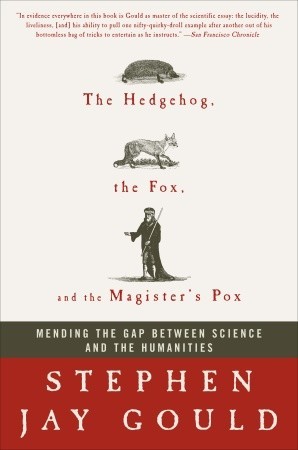 The Hedgehog, the Fox and the Magister’s Pox, Stephen Jay Gould
The Hedgehog, the Fox and the Magister’s Pox, Stephen Jay Gould
The fact is that Stephen Jay Gould is very, very smart. This isn’t a revelatory statement or anything; the man is a well-known genius. And a multidisciplinary one as well. In addition to his well known brilliance in paleontology and evolutionary theory, he was also incredibly well read, a scholar of the classics and history, and read, at the least, several languages.
Gould was also somewhat unique, in my admittedly limited experience, as a well-known scientist who had great respect for the social sciences, the arts, and even religion. And that is really at the heart of this book, which is based on the old proverb about the hedgehog having only one great trick, and the fox having many. Science is the hedgehog; the humanities are the fox. And in his view it is very important to delve deep into the scientific method, but it only really gets you great insight into science. Humanity also needs to consider a wide range of knowledge, as the fox has. And he gets at the heart of the difference in a remarkably perspective way in the final essay in the book, disagreeing with E. O. Wilson’s Consilience – he points out that it’s not that chemicals or genes could never explain exactly why we might like a piece of art, but that even if they can it misses the entire point as far as art and the humanities are concerned. It is an entirely different way and focus of knowing and that is okay.
I have a great respect and agreement in this point of view. Indeed, it is the way I approach my own great interest in science and my own practice and interest in religion – I don’t see them in conflict, because I don’t in anyway see them as answering the same questions or even attempting to do so. However, this book was not as enjoyable as I’d hoped, largely because of what I mentioned at the beginning of this review. Stephen Jay Gould is very, very smart.
The book is ostensibly written for a lay audience, and I suppose technically it is. He does explain in depth most of his references, and so it was understandable. It’s just that without knowing most of his references, which plum the depths not only of scientific history but ancient and classical scholars, Latin proverbs, and esoteric textbooks by Poe, the book gets to be quite dry and boring. I did not have the point of references I needed to understand all of his references. And then adding in whole essays of his observations on what science and the humanities can learn from each other based on how papers are presented and conferences, with what appeared to be gentle ribbing going on for pages. In much in that section I didn’t understand what he was saying, but it had the cadence of a joke.
All in all, the book just wasn’t written for me, and that’s okay. It’s written for someone who will chuckle sardonically in the potshots at the lack of slides in a presentation at a humanities conference, or someone who understands the references to Renaissance humanists. But if you are not that audience, while the theme is interesting and there are bits and pieces to hold ones attention, it is not the book for you.
Filed under: Book Reviews, books, science | Tagged: book reviews, books, history of science, humanities, nonfiction, postmodernism, science, stephen jay gould | 1 Comment »

